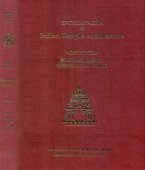Il: 11 definitions
Introduction:
Il means something in Hinduism, Sanskrit, biology, Tamil. If you want to know the exact meaning, history, etymology or English translation of this term then check out the descriptions on this page. Add your comment or reference to a book if you want to contribute to this summary article.
Il has 9 English definitions available.
Images (photo gallery)
Languages of India and abroad
Sanskrit dictionary
[Deutsch Wörterbuch]
Source: Cologne Digital Sanskrit Dictionaries: Böhtlingk and Roth Grosses Petersburger WörterbuchIl (इल्):—, ilayati; imperf. ailayīt; partic. ilita; stillhalten, sich nicht rühren; zur Ruhe kommen: tiṣṭha^te.aya^tā./span> (so mehrere Handschrr., auch [Atharvavedasaṃhitā 1, 17,] [4;] [MÜLLER] schreibt iLa) su kam stehet, haltet still! [Ṛgveda 1, 191, 6.] ka.haṃ vāto.nelayati ka.haṃ na ramate.manaḥ [Atharvavedasaṃhitā 10, 7, 37.] [Taittirīyasaṃhitā 6, 4, 2, 6.] [Aitareyabrāhmaṇa 5, 25.] ilitā hi śere [The Śatapathabrāhmaṇa 2, 3, 1, 3. 3, 9, 2, 5.] āsāṃ devatānāṃ yāṃ yāṃ kāmayate sā bhūtvelayati [10, 3, 3, 8.] elayati [Pāṇini’s acht Bücher 3, 1, 51.] kāmamailayīt (angebl. ved. aor., entsprechend dem klass. aililat) [Scholiast 7, 2, 5,] [Scholiast] [Vopadeva’s Grammatik 8, 86. 18, 1.] Nach [DHĀTUP. 32, 118] bedeutet il, elayati werfen; nach [28, 65] il, ilati schlafen; werfen; gehen. Den imperat. ila (komme) haben wir [Harivaṃśa 620] zur Erklärung des Ursprungs des Nomen proprium ilā (s. d.): tāmiletyeva hovāca manurdaṇḍadharastadā . anugacchasva māṃ bhadre tāmilā pratyuvāca ha . — ava zur Ruhe kommen: tauvili.e vela.āvā.amaila.a ailayīt [Atharvavedasaṃhitā 6, 16, 3.]
Source: Cologne Digital Sanskrit Dictionaries: Sanskrit-Wörterbuch in kürzerer FassungIl (इल्):——
1) ilati — a) kommen [VP.².3,234.] — b) svapnakṣepaṇayoḥ. —
2) ilayati stillstehen , sich nicht rühren , zur Ruhe kommen. iLayati fehlerhaft. — Caus. ilayati ( preraṇe). — Mit ava ( ilayati zur Ruhe kommen.
Sanskrit, also spelled संस्कृतम् (saṃskṛtam), is an ancient language of India commonly seen as the grandmother of the Indo-European language family (even English!). Closely allied with Prakrit and Pali, Sanskrit is more exhaustive in both grammar and terms and has the most extensive collection of literature in the world, greatly surpassing its sister-languages Greek and Latin.
See also (Relevant definitions)
Starts with (+1022): Il-ataikalam, Il-azra, Il-poruluvamai, Il-uraikal, Il-uraiteyvam, Ila, Ila funfun, Ila iroko, Ila kalli, Ila-ilaenal, Ila-karra, Ila-karunkacu, Ila-kulacanrar, Ila-manarpay, Ila-maraka, Ila-nirkattu, Ila-putchi, Ila-veliman, Ila-vincikko, Ilaachi.
Ends with (+1560): A-tyilil, Aavil, Ababil, Abil, Achhegide bondwail, Acil, Addabil, Addambil, Adhyayansheel, Adikil, Adil, Afobil, African foxtail, Agagil, Agasebagil, Aggil, Agil, Agmellil, Aikil, Ail.
Full-text (+255): Ir, Ilvalkkai, Yantrakrama, Illitam, Edaka, Ak'il-suuk, Il-uraikal, Ayal-ilatti, Illanmai, Ak'il-suuc, Mukam-ilvari, Ilporul, Kovil, Maunjibandhanasamskara, Il-azra, Durgasukta, Il-ataikalam, Potuvil, Vanadurgaprakarana, Talai-ileluttu.
Relevant text
One of your search terms exceeds the minimun character amount per search term. This amount currently equals 2.
No search results for Il, Īl, Īḷ, Īḻ in any book or story.
Related products




